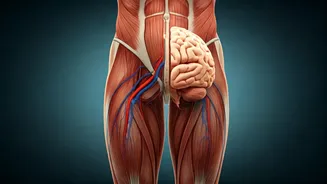The Leg-Brain Link
Recent findings suggest a critical relationship between the condition of your legs and the health of your brain. Studies indicate that weaker legs may
be associated with an increased risk of cognitive decline, including the potential for accelerating the onset of dementia. This connection is linked to several factors. For instance, reduced blood flow to the brain, which is often seen in individuals with leg problems, can deprive brain cells of essential nutrients and oxygen. Additionally, issues with mobility and balance, common in people with leg weakness, can lead to reduced physical activity, impacting overall brain health. Physical inactivity can also contribute to the build-up of harmful proteins in the brain, increasing the risk of cognitive decline. Moreover, the inflammatory processes associated with leg conditions may also impact brain function, contributing to cognitive decline. Recognizing this link underscores the importance of maintaining leg strength and mobility for overall brain health.
Warning Signs to Watch
Identifying early warning signs is crucial for addressing potential issues with both leg and brain health. Pay close attention to any changes in your walking ability, such as a slower pace, shuffling feet, or difficulty maintaining balance. These can be indicators of underlying problems that warrant attention. Also, keep an eye out for a noticeable decrease in leg strength, such as trouble getting up from a chair or climbing stairs. Memory lapses or difficulty with concentration might be a subtle early sign of cognitive issues. Additionally, if you experience frequent falls or a lack of coordination, it is time to consult a healthcare professional. Addressing these symptoms promptly through early intervention and lifestyle adjustments can help to mitigate the risk of further cognitive decline and improve overall leg health. It's also important to note that these symptoms can be associated with other health concerns, so a thorough evaluation is always beneficial.
Boosting Your Health
There are several steps you can take to proactively support both your leg and brain health. Regular physical exercise is fundamental, especially activities that enhance leg strength and cardiovascular fitness. Exercises like brisk walking, cycling, swimming, and strength training can significantly improve circulation and muscle strength, which are beneficial for both leg function and brain health. In addition to exercise, maintaining a balanced diet rich in essential nutrients, like omega-3 fatty acids, antioxidants, and vitamins, is very important. These nutrients provide the brain with the nourishment it needs. Adequate sleep, around 7-8 hours per night, is also critical for cognitive function and overall health, as sleep allows the brain to rest and repair. Managing stress through techniques like yoga, meditation, or deep breathing exercises is also key, since chronic stress can negatively impact brain health. Furthermore, engaging in mentally stimulating activities like reading, puzzles, and learning new skills helps to keep the brain active and can prevent cognitive decline. Consider a check-up with a doctor to discuss any changes.
Seeking Professional Guidance
If you notice any concerning symptoms related to leg weakness or cognitive decline, seeking professional guidance is crucial. Consult with a doctor who can conduct a thorough evaluation to identify the underlying causes and recommend appropriate treatment plans. Depending on your situation, this may involve consultations with neurologists, physical therapists, or other specialists. A healthcare professional can perform tests, such as cognitive assessments or imaging, to evaluate your brain health and assess the extent of cognitive decline, if any. They can also perform tests of strength, balance, and gait to assess leg health. Personalized treatment plans may involve physical therapy to improve strength and mobility, medication to manage symptoms, or lifestyle adjustments to support overall well-being. Early intervention is often key. A proactive approach to healthcare, in consultation with medical professionals, allows for the best outcomes.














